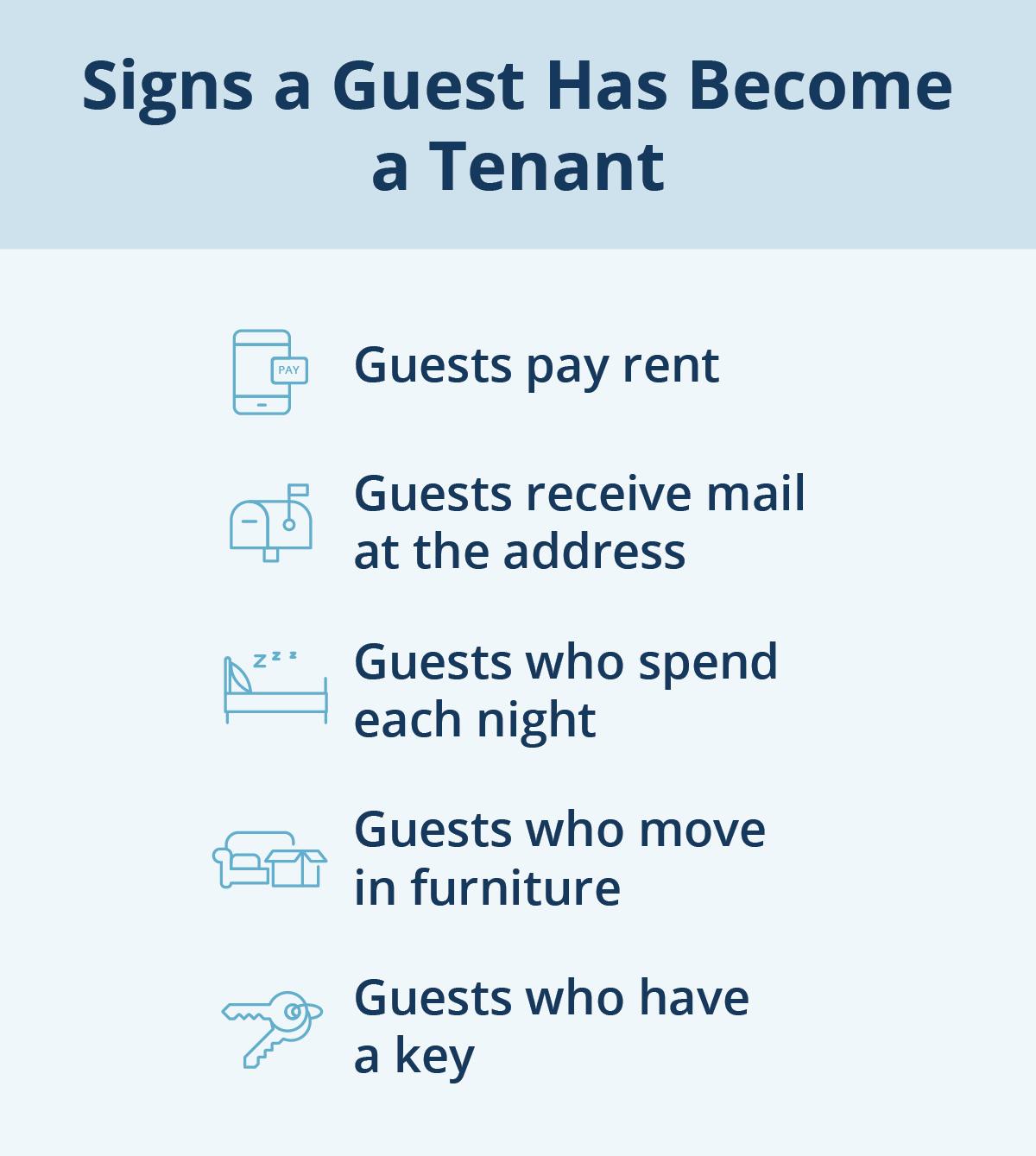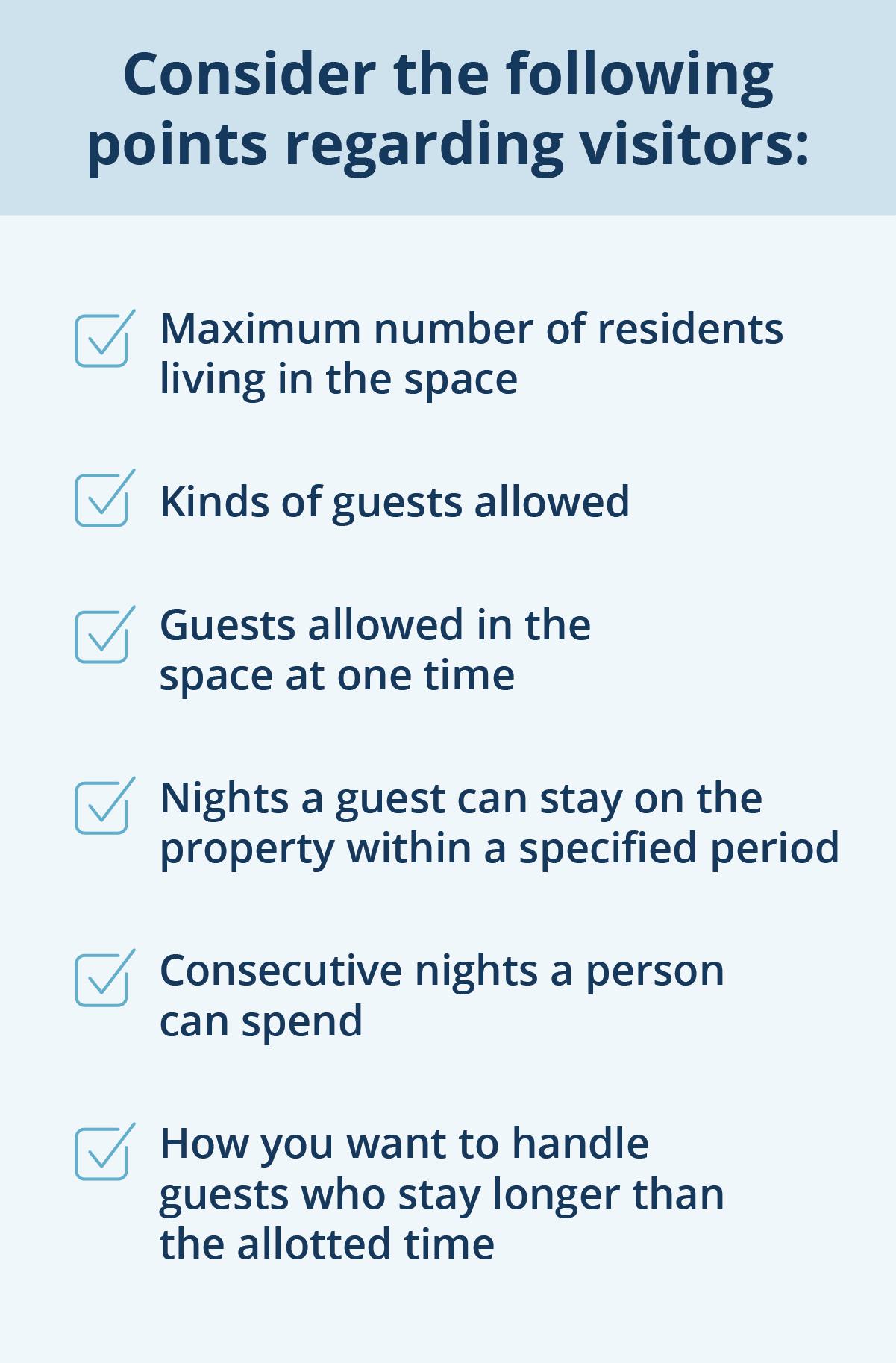
Disclaimer: This blog post is meant for informational purposes only and does not constitute professional legal advice. Consult with a local licensed attorney for specific legal guidance.
As a property owner, you’re liable for the people who call your property home. That’s why you carefully screen each potential tenant and then write up a lease agreement explicitly stating who will be occupying the unit. But what does occupying the unit really mean, and when a guest crosses the territory from temporary visitor to ongoing occupant? How can you recognize the situation and enforce your policy?
The Difference Between a Tenant and a Guest
In most basic terms, a tenant is the person (or people) who pays rent to live on your property. This is who you are leasing the rental to, naming on the lease, and holding responsible for respecting every stipulation in the lease (e.g., paying rent on time, compliance with laws, appropriately caring for the property, etc.). Basically, any adult over the age of 18 who is living in the unit. However, even if a name is not listed on the lease and they are paying rent, they can be considered a tenant.
A guest is a person who visits occasionally and maybe sleeps over a few times in a given period. A guest is not listed on the lease and is not responsible for paying rent or upholding other obligations in the lease agreement.
If your rental property has been empty for some time, you could also be running the risk of other unwanted guests: squatters. Regularly check on your property, especially if you’re an absentee landlord, to be sure an undetected visitor has not taken up residence on your property.
Recognizing When a Guest Has Taken Up Residence
The gray area is home to those long-term guests who have moved into your rental without your permission. Some ways to spot these guests-gone-rogue include the following:

- Guests pay rent: Whether the guest has a verbal agreement with you and has offered to pay a portion of rent or cover part of utilities, this makes the guest a tenant. When money changes hands, you and the resident are entered into an informal landlord-tenant agreement.
- Guests receive mail at the address: If a guest gets letters and packages at the property, this is a sign of someone who has moved in. Even if this person spends time at another place but receives mail at your property, you can present this evidence.
- Guests who spend each night: Someone who regularly sleeps at your place is no longer a guest. A way to spot this is through the use of security cameras or by seeing if the guest leaves their car parked at the residence overnight. If parking is included in the lease agreement, you know which vehicles and plate numbers are allowed on your property. However, frequent daytime-only visitors qualify as guests.
- Guests who move in furniture: This person has set up shop. Keeping a significant number of personal belongings, furniture, and even pets at your rental indicates residence.
- Guests who have a key: If the guest has a key, whether they were given the spare or (legally or illegally) duplicated the key, and are spending nights, this makes them more of a tenant than a guest.
If you’ve noticed these behaviors above in a vacant unit, you could have a squatter on your hands. It’s important you take action to address both long-term guests and potential squatters immediately to prevent more serious legal issues down the road. Preventative action is even better.
If you’ve noticed these behaviors in an occupied unit, you likely have a long-term guest who’s turned into a tenant. To help you distinguish the difference further, here are examples of different situations, where individuals can be considered a guest, and where they can be considered a tenant.
Guests
- College students visiting for a weekend or spring/winter breaks but who always return to school
- A boyfriend or girlfriend, or just a friend, who stays a few nights a month or visits frequently during the daytime
- Parents visiting to help care for a new child or to stay a few weeks after receiving medical care
- A nanny or other form of domestic help who works during the day and may occasionally stay over
Tenants
- College students who are home for the summer
- College students who dropped out of school and aren’t returning after a break
- Recent graduates return home for an undefined time to get on their feet
- A boyfriend or girlfriend who spends most nights in the unit, often for weeks at a time
- A friend who doesn’t have somewhere to live and has been apartment hunting for a month
- Parents who move in because they no longer take good care of themselves on their own
- Live-in help, like an au pair
What Does The Law Say?
Navigating the transition from a guest to a tenant isn't always straightforward, and the legal guidelines vary from state to state. No federal law specifically defines when a guest becomes a tenant. Instead, each state has its own laws and regulations governing this issue. Some states have specific cut-off points, while others rely on various factors to determine whether a guest has become a tenant.
As of March 2024, these are the laws regarding a guest becoming a tenant in each state. However, for the most accurate and up-to-date requirements, reach out to a local legal expert.
States with Official Cut-Off Points
The following states have official cut-off points for determining when a guest becomes a tenant:
Alabama: 30 days
Arizona: 29 days
California: 14 days within 6 months, or 7 nights in a row
Colorado: 14 days within 6 months
Connecticut: 14 days within 6 months
Florida: 14 days within 6 months, or 7 nights in a row
Georgia: If the guest contributes towards rent or provides services to live at the property
Illinois: If the guest establishes residency (by receiving mail to the property address, puts the property address on official identification documents, etc.)
Indiana: 30 days
Kansas: 30 days
Maine: 14 days within 6 months
Maryland: If the guest contributes towards rent or provides services to live at the property
Minnesota: If the guest contributes towards rent or provides services to live at the property
Mississippi: If the guest contributes towards rent
Missouri: 14 days within 12 months
New York: 30 days
North Carolina: 14 days
Oregon: 14 days within 6 months
Ohio: 30 days
Pennsylvania: If the guest contributes towards rent or after 30 days
Texas: If not defined in the rental agreement, then if the guest contributes towards rent or establishes residency (by receiving mail to the property address, puts the property address on official identification documents, etc.)
States Without Official Cut-Off Points for When a Guest Becomes a Tenant
The following states do not have official cut-off points for determining when a guest becomes a tenant:
- Alaska
- Delaware
- Hawaii
- Idaho
- Iowa
- Kentucky
- Louisiana
- Massachusetts
- Michigan
- Nebraska
- Nevada
- New Hampshire
- New Jersey
- New Mexico
- North Dakota
- Oklahoma
- Rhode Island
- South Carolina
- South Dakota
- Tennessee
- Utah
- Vermont
- Virginia
- Washington
- West Virginia
- Wisconsin
- Wyoming
In states without an official cut-off point, courts will look at a variety of factors to determine whether a guest has become a tenant, including:
- The length of time the guest has stayed
- Whether the guest has paid rent or contributed to household expenses
- Whether the guest has received mail or packages at the property
- Whether the guest has listed the property as their address on their driver's license or other official documents
- Whether the guest has used the property as their primary residence
Other Relevant Stipulations
In addition to the factors discussed, a few other stipulations may be relevant to determining whether a guest has become a tenant. For example, some states have laws specifically protecting tenants who are victims of domestic violence or sexual assault. These laws may allow tenants to stay in their homes even if they are unable to pay rent or otherwise meet the terms of their lease.
It is also important to note that a landlord-tenant arrangement can be created even if there is no written lease agreement. In fact, in most states, oral lease agreements are just as valid as written lease agreements.
Consult Local Authorities Before Enforcing Your Tenant Guest Policy
Given the complexity and variability of these legal matters, it's advisable to consult with local legal authorities or an attorney experienced in property law. They can offer guidance specific to your state and property, ensuring that you are in compliance with all relevant regulations.
Understanding the legal framework surrounding guests turning into tenants is essential for property owners and managers to protect their rights and the rights of their occupants. While some states have clear guidelines, others rely on specific circumstances.
Seeking legal counsel and staying informed about your state's laws is the best way to navigate this often intricate aspect of property management. A property manager can help you do this.
Writing the Tenant Guest Policy in Your Lease Agreement
When writing the tenant guest policy in your lease, you should consider the following points regarding visitors:

- The maximum number of residents living in the space
- What kinds of guests do you allow (e.g., specifying that only friends or relatives of the existing tenants may occupy the space without your consent, meaning strangers—subletters or guests from Airbnb—are prohibited)
- How many guests you will allow in the space at one time
- How many nights a guest can stay on the property within a specified period
- How many consecutive nights a person can spend
- How you want to handle guests who stay longer than the allotted time (e.g., evicting the tenants who violate this portion of the lease or adding long-term guests to the lease as tenants)
As the property owner, you also get to decide the maximum occupancy of the unit. How many people do you feel comfortable living in the space? If there are five bedrooms, but you’d prefer to have only four occupants in the space, for example, that’s acceptable as long as it’s stipulated in the rental agreement guest policy.
If there are two bedrooms, but you’re fine with having tenants share a room, you can state the maximum number of occupants as three. Note: Most municipalities have occupancy laws stipulating how many people can live in a space based on square footage. However, this includes the total square footage of the unit, including the living room, kitchen, bathrooms, etc., so unless you suspect a bunch of people are regularly crashing on the couch of your rental, it’s unlikely they’re breaking occupancy laws.
You also get to define at what point a guest overstays their welcome. Most landlords allow guests to stay over no more than 10-14 days in a six-month period. From there, you can decide whether a guest staying 15 days or longer gives you grounds to evict the tenants for breaking the lease or whether you want to amend your lease and if the rent will increase as a result.
For example, you can adjust the language below in your own rental agreement guest policy to fit your needs:
Guests may stay a maximum of 14 days on the property in a six-month period or 7 nights consecutively. Any guest residing at the property for more than 14 days in a six-month period or spending more than 7 nights consecutively will be considered a tenant. This person must be added to the lease agreement. The landlord may increase the rent whenever a new tenant is added to the lease.
However, we recommend customizing your tenant guest policy to protect your property rather than falling into the trap of using a standard lease agreement. Consult with your attorney as well to prevent any issues before they begin.
When bringing in new tenants, establishing a good landlord-tenant relationship from the start of the lease is important. This way, you can be clear about the rules of your property and explain the consequences of breaking them, as well as keep channels open for communication.
Talk to the Tenant to Revise the Rental Agreement Guest Policy
If you find that a guest has violated a part of your lease agreement, it’s necessary to confront the tenant and take action as soon as possible. You can offer the option to amend the lease, as outlined in your tenant guest policy, or to renew the lease at a higher rate and for a longer term.
When it comes to increasing rent, be aware of your local jurisdiction’s laws surrounding the matter. If you’ve successfully created a positive landlord-tenant relationship, you should be able to talk out any changes or violations to the tenant guest policy freely.
As a landlord, it’s important to have all adult occupants on the lease. This is so you can guarantee their obligation to uphold the lease terms and verify who is living on your property. It also protects you legally if they were to violate a portion of the lease.
If you choose not to amend the lease, you can order the guest to vacate or stay over less frequently in accordance with the tenant guest policy. Otherwise, your option is to serve the tenant with a violation notice and threaten to terminate the agreement with eviction. If you choose this route, you must also provide written notice to the renter(s) of their eviction with the lead time governed by the state and bring in an attorney.
Why You Should Not Accept Rent From Guests
As mentioned before, you can find yourself in a difficult situation if you start to accept rent from a non-tenant. This enters you into a landlord-tenant agreement, even though they’re not specified in the lease. A rent payment is typically considered a monetary transaction but can also be a service such as maintenance labor. By accepting money (or a service equivalent), the guest can be granted the same rights as a tenant on the lease and will be harder to remove. It’s important to note that even if the money has not yet changed hands, but you’ve agreed to accept it, you still enter into that agreement.
In this situation, you have a legal tenant on your hands but not the paperwork to back it up. If you try to evict the guest or the tenants who brought in the guest, you’ll end up with an uphill legal battle involving landlord-tenant law because of the rights they’ve gained in paying you.
In the case of tenant evictions, there are three main reasons you can evict a tenant:
- If a tenant fails to pay rent
- If a tenant poses a health or safety risk to a property and/or other renters at a property
- If a tenant breaks the terms of a rental lease agreement
Accepting rent payment from a guest gets dicey because you’ve basically forfeited your options. If you never amended the lease to include them, you can’t prove if a guest-gone-tenant fails to pay rent. Unless there is a health or safety risk to the property by allowing them there, you may also not have legal grounds to evict.
Additionally, by not amending the lease, you haven’t required the guest-turned-tenant to complete a background check, introducing even more potential risks. Finally, the tenants living in the unit with the guest have been absolved from breaking the rental agreement terms because you have accepted payment.
Again, these guidelines are meant to keep you aware of the challenges around dealing with long-term guests. No matter what stage you are at in handling these issues, speaking with a legal professional is always your best bet.
Prevent Tenant Guest Policy Problems Before They Happen
The best way to handle sticky situations where guests overstay their welcome is to be proactive. Clearly define the tenant guest policy in your rental agreement and keep open communication with your tenants. Tenants might come to you asking for permission to allow a long-term guest for a temporary period. If you’re okay with this, be sure to create and have them sign a long-term guest agreement.
In these gray areas, landlord-tenant law is very complicated and varies widely by state, so you want to ensure you (or an attorney you work with) are well versed in the guidelines that govern guests, notices to quit, rent payments, and definitions of tenants.
Periodically check on your property as well. Use security cameras to monitor who’s coming and going. Most jurisdictions allow a property owner to enter a unit after giving the residents a minimum of 24 hours written notice. If the rental is vacant, visit the property once a year or every few months to combat squatters moving in. For a squatter to take possession of the property, they must live on it for an uninterrupted number of years designated by your jurisdiction.
Proper communication, strict adherence to the law, and a well-structured rental agreement guest policy within your lease agreement are all important for keeping guests guests and tenants tenants. Luckily, a professional property manager can help you in all these areas, and can both draft and enforce a tenant guest policy that protects your property for years to come.
